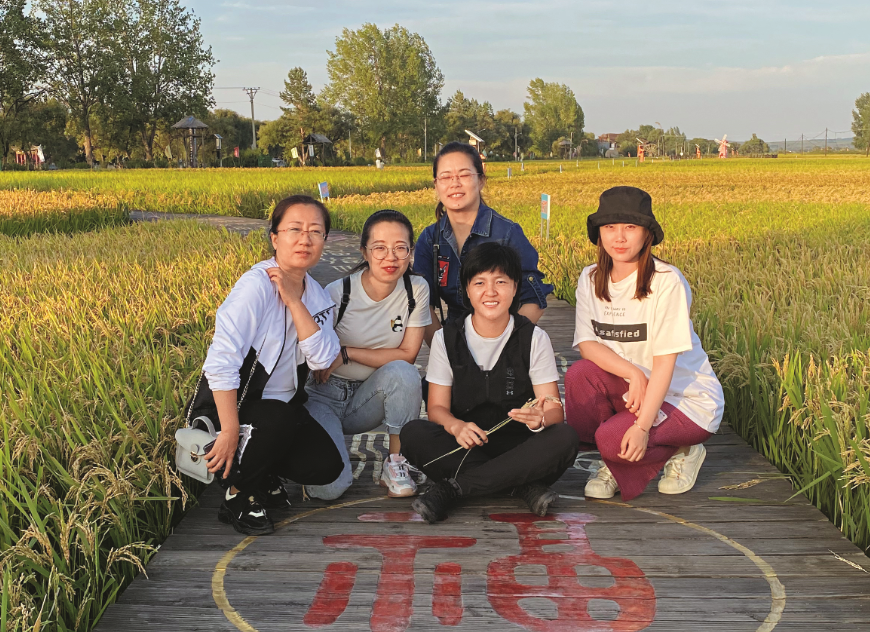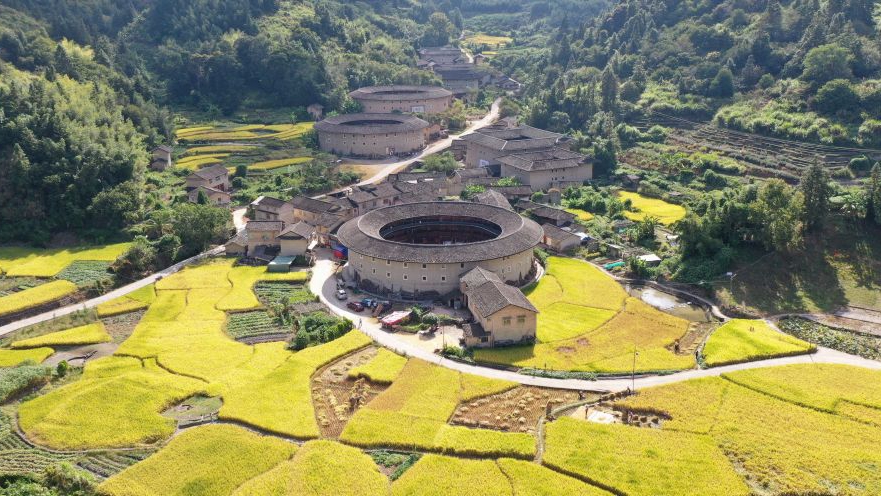Internet thinking gives a boost to rice business in northeast China
"Over ten thousand years ago, the volcano erupted, and a volcanic plateau was thus formed. Being weathered, the plateau was then covered by a thick layer of nutritious humus soil and then evolved into a unique type of field called 'shiban,' which literally means a rock board."

Chen Yujia, sales manager of a rice cooperative in Ning'an, northeast China's Heilongjiang province. (Photo/Mudanjiang Daily)
In Shangguandi village, Bohai township, Ning'an, northeast China's Heilongjiang province, Chen Yujia, sales manager of a local rice cooperative, introduced the history of shiban rice to online audiences on a livestream platform.
Thanks to the unique natural environment and traditional cultivation methods, shiban rice is both tasty and nutritious.
The cooperative that Chen works for was established in 2008 by Shangguandi village for better development of the village's rice business. However, it failed to increase villagers' income because little innovation was made to renew planting techniques or to expand sales channels.
In 2016, Chen returned to the village and volunteered to serve as the sales manager of the cooperative. She has successfully helped her fellow villagers increase income by optimizing rice growing, processing and sales with internet thinking.
Chen, who was 27 then, together with other two young employees of the cooperative, presented the cultivation of shiban rice to consumers via short videos and livestreaming, sharing with the latter the stories of the crop and authentic rural lifestyles. Besides, they also opened online shops to expand the sales channels of the rice. Gradually, they gained many followers online and received more and more orders.

Chen Yujia sells rice on a livestream platform. (Photo/Mudanjiang Daily)
In the meantime, the cooperative also worked to improve the quality of shiban rice, "greening" every procedure from seed selection to farming and processing.
Besides, Chen constantly upgraded the sales models to bring the consumers better experiences. For instance, the cooperative launched an innovative activity that allows customers to "adopt" rice fields in the spring and reap the yield in the autumn. It would also invite the "adopters" to join rice transplanting and harvesting in the village.
"All the 200 mu (13.3 hectares) of organic rice field had been booked before the transplanting started, and we received earnest payment of nearly 4 million yuan ($526,113)," Chen said.
What's more, customers can preserve their rice in a barn in the village with thermostats and hygrostats, and get the rice back whenever they want. The cooperative has also established an agricultural internet of things, with which the customers can see how the rice is produced by only scanning a QR code.
It is learned that currently, around 1/3 of the cooperative's turnover is from online channels.
Xu believes that the internet has become a powerful engine driving rural vitalization. "On one hand, we should advance the branding of agricultural products through the internet. On the other hand, we must have the courage to employ new methods to further expand the market," Chen said.

Chen Yujia poses for a picture with her partners in a rice field. (Photo/Women of China magazine)
Photos
Related Stories
- Young woman in NE China's Heilongjiang uses Internet to bring wealth to villagers
- China makes great strides in rural vitalization over past 5 years
- Young Chinese help drive rural vitalization with entrepreneurship
- Nanning in China's Guangxi develops locally-featured industries to boost rural vitalization
- Village in China's Guizhou brings wealth to residents by developing industries suited to local conditions
- Man from north China's Hebei brings prosperity to rural residents through flower planting
- Village in China's Guangdong undergoes transformation on march toward common prosperity
- Highest village in China's Jiangsu embraces prosperity after developing local tea industry
- Man in China's Shanxi brings wealth to fellow villagers after developing flourishing daylily industry
- Space station rice tests show promise
- Rice harvested in SW China's Guizhou
- Rice ripens in Yongfeng, Sichuan
- Rice harvested in SE China's Fujian
- Chinese scientists identify genes for more heat-tolerant rice
- Giant rice spike fireworks fired to commemorate Yuan Longping, China's 'father of hybrid rice'
- Children experience rice transplanting in Jiangxi
- Chinese scientists identify yield-related genes in maize, rice
- Seawater rice sees bumper harvest in N China's Tianjin
Copyright © 2022 People's Daily Online. All Rights Reserved.









